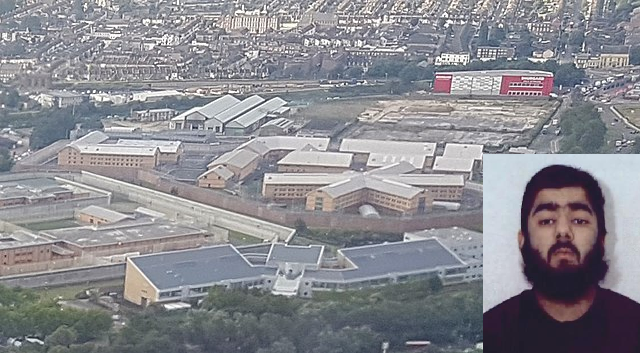UK’s failure to deal with Islamist gangs has turned British prisons into places where non-Muslim prisoners and staff live in fear. They have also become incubators for jihadi attacks.
That’s the assessment offered by Jonathan Hall, QC, independent reviewer of terrorist legislation in his report, Terrorism in Prisons. The report, issued in April, states that over the course of 15 years, Islamist inmates have adopted an “anti-state Islamist stance” which results in violence towards non-Muslim inmates, prison staff and the general public. “Islamist group behaviour has come to be seen as part of the prison landscape,” the report states.
Hall’s investigation into the response to Islamist gangs by Her Majesty’s Prison and Probation Service (HMPPS), was commissioned after convicted Islamist terrorist Usman Khan carried out a terrorist attack near London Bridge in 2019. Khan, who was strapped with an authentic looking — but fake — suicide belt, goaded police to shoot him, knowing full well they feared risking more lives had the belt been loaded with explosives. Khan murdered two people, Jack Merritt and Saskia Jones, and injured several others before subsequently being shot and killed by police. Khan had been released early from prison and enrolled in a de-radicalization program.
Khan’s attack, perpetrated while on early release from prison, is part of a larger pattern. “The last 4 completed terrorist attacks in Great Britain have been carried out by prisoners serving their sentences in custody (HMP Whitemoor) or on licence in the community (Fishmongers’ Hall, Streatham, Reading),” Hall states.
Islamists convicted of terrorism offenses enjoy a high status while in prison, Hall stated. “For some prisoners terrorism offences amount to a glamourous blow against the authorities, untainted by grubby personal motives and serving a wider purpose, giving them a distinctly heroic profile,” he wrote.
Khan played a well-documented role in radicalizing his fellow inmates while in prison prior to the 2019 London Bridge attack. In 2011, he attacked a fellow prisoner while shouting “Allahu Akbar,” the report states. “In 2012, after Khan’s arrival in a new wing, prisoners started to wear religious dress most of the time; Khan jumped on the netting and recited a poem including the words ‘Cut off the kuffar’s head.’” Hall reported.
Another prisoner, Sudesh Amman, who served time for terrorism prior to stabbing two people in Streatham in 2020, had used his time in confinement to bully non-Muslims. “In July 2018 Amman was recorded, together with a group of other prisoners (who included recent converts), crowding round another prisoner who subsequently converted,” Hall writes. “This was assessed as an attempt to convert non-Muslims on the house block.”
Prison staff themselves are not immune to bullying and harassment by Islamist gangs. For example, Islamists group together to intimidate staff when their behavior is challenged, the report states. Furthermore, Islamists make insincere allegations of discrimination and “Islamophobia” as a method to delegitimize staff and prison policies.
Islamist inmates are setting up sharia courts that subject Muslims to flogging. These same inmates are assaulting non-Muslim inmates for “faith-based reasons,” the report states, adding that Islamist inmates undermine prison imams by encouraging their fellow Muslims to boycott Friday prayers.
The upshot of the report is that Islamists have been able to use UK prisons as recruiting and training grounds for their cause with prisoners distributing pro-jihad propaganda to their fellow inmates and keeping terrorist instruction manuals in their cells. Terrorist attacks inside prison are rare but some acts of violence “appear closely related to terrorist ideology,’ the report states.
“In 2014, two prisoners at HMP Full Sutton seriously attacked prison guards in the wake of the terrorist murder of Fusilier Lee Rigby whilst calling for the release of terrorist offenders,” Hall wrote. “In 2020 at HMP Wakefield, the Taliban bombmaker Kalid Ali stabbed a guard with a biro whilst shouting “Allahu Akbar.”
In his report, Hall called on prison officials to pay closer attention to Islamist groups and hierarchies. He also called on officials to create an inventory of “terrorist risk behavior” and interrupt these behaviors when observed.
It may also be necessary to engage in covert surveillance of prisoners, Hall stated, adding that law enforcement and security officials should “carry out a systematic audit of covert powers to ensure that the grounds for authorising covert investigatory powers that are currently available to HMPPS are sufficient.”
The report also encourages separating extremists, whether they are Islamists or right-wingers, away from the general population. “Removing prisoners who are keen to exercise Islamist or Right Wing terrorist influence is likely to improve the custodial experience of the remaining prisoners and increase the prospects of rehabilitation,” Hall wrote. “This is sometimes referred to as reducing the temperature on the wing.”
Given the difficulties associated with running prisons in general, it’s unfair to regard the problem of Islamist gangs in prisons as the result of a catastrophic failure on the part of the officials who run them, Hall stated. But the fact is, it’s a huge problem that needs to be fixed.
“Public confidence in the criminal justice system is shaken if terrorism occurs in prison or if people enter prison only to come out more dangerous; and the ability of prisons to function is gravely degraded if prison officers fear imminent terrorist attack,” he wrote.
Wasiq Wasiq is a journalist specializing in defense and terrorism. You can follow him on Twitter: @WasiqUK
